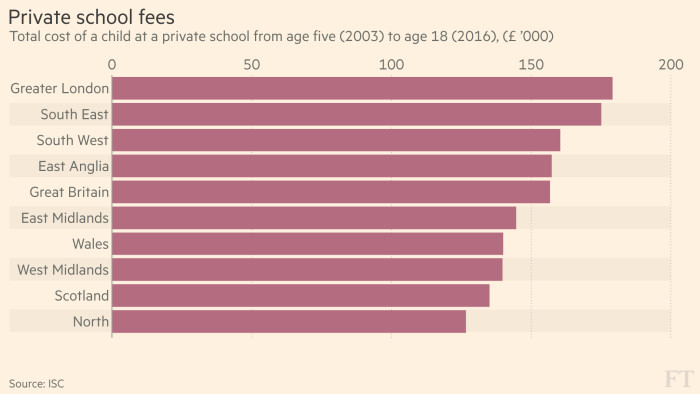£180,000 — 13 years of London private school fees

Roula Khalaf, Editor of the FT, selects her favourite stories in this weekly newsletter.
What does this chart show?
That the cost of day school private education has never been so expensive. Parents living in London who entered their child at reception — or primary school — at age five in 2003, can expect to have paid as much as £180,000 when they leave this year aged 18, according to research by Lloyds Bank Private Banking.
Across the UK, the average cost of educating a child at a private day school has increased to almost £160,000, with annual fees having nearly doubled over the 13-year period. Lloyds’ figures show that parents have seen bills rocket from £7,308 a year in 2003 to £13,341 in 2016.
Looking at the past five years, day school fees have risen by 21 per cent — compared with a 13 per cent rise in the retail prices index over the same period and a 5 per cent boost to full-time gross annual earnings.
Why has it got so expensive?
An influx of foreign parents wanting to tap into the British education system has pushed up demand. With demand for more places comes the opportunity to raise fees. And it is likely to get more expensive.
Killik & Co, the wealth manager, estimates that for a child enrolled last year — and graduating in 2028 — the bill for a private day school could reach as much as £286,000, far beyond the reach of anyone earning the UK average salary of £27,600 a year.
Some schools, including Dulwich College and boarding school Harrow, are capitalising on the growing appetite for a British education by embarking on franchising exercises around the world. The latter, founded in 1572 under a royal charter granted by Elizabeth I, has been a pioneer in the Far East and now has branches in Bangkok, Beijing, Hong Kong and Shanghai.
How much more can I expect to pay for boarding?
Almost three times as much, according to wealth manager Killik & Co. Fees for a child boarding from the age of 13, having earlier attended a private day school, could reach as much as £468,000, up from £435,000 the previous year.
Do fees vary by region?
London is unsurprisingly the most expensive part of the country for a private education, at £179,145 for the 13-year day school total, followed by the south-east at £175,000, according to the Lloyds research. Fees are significantly lower in the north, at £126,600.
Independent schools are expensive, but are they worth the money?
With 625,000 children currently educated at approximately 2,600 schools, the numbers suggest fee-paying parents think so. Some will cite the academic results achieved by independent schools; others will look to the potential future career advantages conferred by rubbing shoulders with the aspiring high achievers of business and the professions.
The influence of one of the oldest — Eton College (current fees almost £40,000 a year) — was illustrated when Michael Gove, as education secretary in 2014, attacked David Cameron’s cabinet for containing a “preposterous” number of Old Etonians.
Whether or not most parents agree with such sentiments, they will be acutely aware of the inequality described by former prime minister John Major, who went to Rutlish Grammar School in south London. A year earlier, he warned that “in every single sphere of British influence, the upper echelons of power in 2013 are held overwhelmingly by the privately educated or the affluent middle class”.
Comments